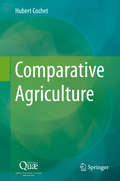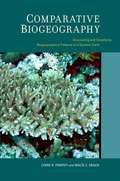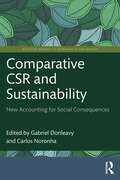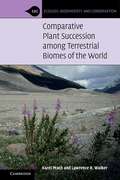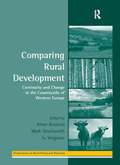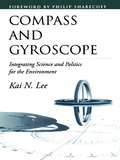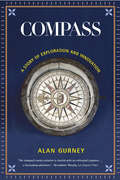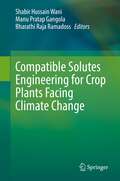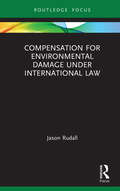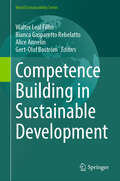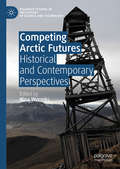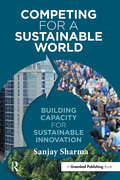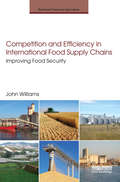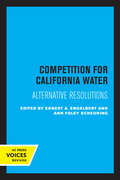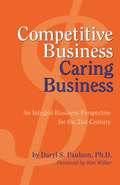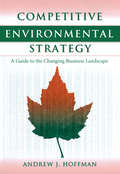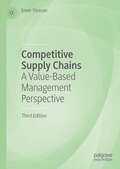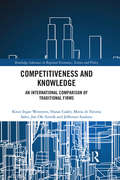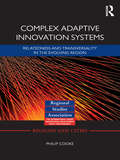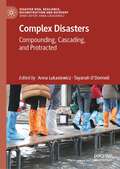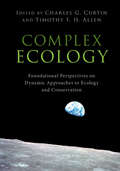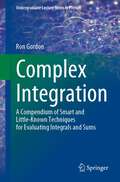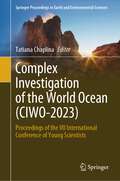- Table View
- List View
Comparative Agriculture
by Hubert CochetIn the first section dedicated to theoretical thoughts on comparative agriculture, Hubert Cochet introduces the notion of "agricultural development", the very subject of comparative agriculture, with a restored endogenous dimension. He then describes how this approach was slowly consolidated, around the concept of agrarian system in particular. The comparison of agricultural transformations in time and space highlights the importance of the comparatist approach to production processes, their trajectories and differentiation on a worldwide scale. The second section which focuses on the methods and expertise of comparative agriculture, tackles the issues of landscape analysis, field surveys and the historical approach underlying comparative agriculture. It sums up the economic tools mobilised as well as the evaluation perspectives opened up by comparative agriculture.
Comparative Biogeography: Discovering and Classifying Biogeographical Patterns of a Dynamic Earth
by Lynne R. Parenti Malte C. EbachTo unravel the complex shared history of the Earth and its life forms, biogeographers analyze patterns of biodiversity, species distribution, and geological history. So far, the field of biogeography has been fragmented into divergent systematic and evolutionary approaches, with no overarching or unifying research theme or method. In this text, Lynne Parenti and Malte Ebach address this discord and outline comparative tools to unify biogeography. Rooted in phylogenetic systematics, this comparative biogeographic approach offers a comprehensive empirical framework for discovering and deciphering the patterns and processes of the distribution of life on Earth. The authors cover biogeography from its fundamental ideas to the most effective ways to implement them. Real-life examples illustrate concepts and problems, including the first comparative biogeographical analysis of the Indo-West Pacific, an introduction to biogeographical concepts rooted in the earth sciences, and the integration of phylogeny, evolution and earth history.
Comparative CSR and Sustainability: New Accounting for Social Consequences (Routledge Research in Sustainability and Business)
by Gabriel Donleavy and Carlos NoronhaThis book breaks new ground by providing a structured and cohesive set of contributions on the actions, developments, problems and theories of corporate social responsibility (CSR). With new case studies from the UN’s Least Developed Countries (LDCs), contributors in this book investigate how firms in Eastern and Western countries are responding to and making use of evolving CSR guidelines. The book addresses the following questions: is CSR simply greenwashing or an authentic commitment to responsible corporate citizenship? Has globalization drawn CSR conduct in LDCs closer to that of industrialized countries? Stakeholder theory, actor–network theory and a new orbital theory of accountability are applied to give coherence to the case studies. Other chapters address greenwashing in reports, the impact of CSR in socially stigmatized occupations, an analysis on what responsibility precisely entails in CSR, and the interface between law and CSR. The book also considers the impact of COVID-19 on the hospitality industry, and includes a contribution from Ukrainian scholars, one written while their city of Kharkiv was under attack by Russian forces. This book will be a useful reference to those interested in discussions on crises, climate change, and SDGs and realizing sustainable goals through CSR.
Comparative Plant Succession among Terrestrial Biomes of the World (Ecology, Biodiversity and Conservation)
by Lawrence R. Walker Karel PrachDespite a century of study by ecologists, recovery following disturbances (succession) is not fully understood. This book provides the first global synthesis that compares plant succession in all major terrestrial biomes and after all major terrestrial disturbances. It asks critical questions such as: Does succession follow general patterns across biomes and disturbance types? Do factors that control succession differ from biome to biome? If common drivers exist, what are they? Are they abiotic or biotic, or both? The authors provide insights on broad, generalizable patterns that go beyond site-specific studies, and present discussions on factors such as varying temporal dynamics, latitudinal differences, human-caused vs. natural disturbances, and the role of invasive alien species. This book is a must-read for researchers and students in ecology, plant ecology, restoration ecology and conservation biology. It also provides a valuable framework to aid land managers attempting to manipulate successional recovery following increasingly intense and widespread human-made disturbances.
Comparing Futures for the Sacramento-San Joaquin Delta
by Jay R. Lund Ellen Hanak William E. Fleenor William A. Bennett Richard E. Howitt Jeffrey F. Mount Peter B. MoyleWritten by a team of independent water experts, this analysis of the latest data evaluates proposed solutions to the Sacramento-San Joaquin Delta's myriad problems. The authors find the current policy unsustainable and suggest a suitable strategy.
Comparing Rural Development: Continuity and Change in the Countryside of Western Europe (Perspectives on Rural Policy and Planning)
by Mark Shucksmith Arnar ÁrnasonAt a time when there is major reorientation of rural economies in Europe, and the emergence of new possibilities both for governance and for conflict, this book brings together a group of leading academics in the fields of geography, sociology and anthropology to examine how such changes are taking place in the west of Europe. It describes, analyses and theorises the role of networks and social capital in rural development in six countries: Finland, Ireland, Italy, Norway, Scotland and Sweden, and addresses the tension between studying 'local' rural development and the 'globalized' nature of modern economies and societies. An approach to networks and social capital is used as a way of drawing attention to the non-economic dimensions of rural development and society. The book stresses that the links between society and economics are of key importance.
Compass and Gyroscope: Integrating Science And Politics For The Environment
by Philip Shabecoff Kai N. LeeUsing the Columbia River Basin in the Pacific Northwest as a case study, Kai Lee describes the concept and practice of "adaptive management," as he examines the successes and failures of past and present management experiences. Throughout the book, the author delves deeply into the theoretical framework behind the real-world experience, exploring how theories of science, politics, and cognitive psychology can be integrated into environmental management plans to increase their effectiveness.
Compass: A Story of Exploration and Innovation
by Alan Gurney"The compass' rocky evolution is charted with an enthusiast's passion....A fascinating adventure."--Bernadette Murphy, Los Angeles Times Compass chronicles the misadventures of those who attempted to perfect the magnetic compass--so precious to sixteenth-century seamen that, by law, any man found tampering with it had his hand pinned to the mast with a dagger. From the time man first took to the seas until only one thousand years ago, sight and winds were the sailor's only navigational aids. It was not until the development of the compass that maps and charts could be used with any accuracy--even so, it would be hundreds of years and thousands of shipwrecks before the marvelous instrument was perfected. And its history up to modern times is filled with the stories of disasters that befell sailors who misused it. In this page-turning history of man's search for reliable navigation of treacherous sea routes around the globe, Alan Gurney brings to life the instrument Victor Hugo called "the soul of the ship."
Compatible Solutes Engineering for Crop Plants Facing Climate Change
by Shabir Hussain Wani Manu Pratap Gangola Bharathi Raja RamadossPlants, being sessile and autotrophic in nature, must cope with challenging environmental aberrations and therefore have evolved various responsive or defensive mechanisms including stress sensing mechanisms, antioxidant system, signaling pathways, secondary metabolites biosynthesis, and other defensive pathways among which accumulation of osmolytes or osmo-protectants is an important phenomenon. Osmolytes with organic chemical nature termed as compatible solutes are highly soluble compounds with no net charge at physiological pH and nontoxic at higher concentrations to plant cells. Compatible solutes in plants involve compounds like proline, glycine betaine, polyamines, trehalose, raffinose family oligosaccharides, fructans, gamma aminobutyric acid (GABA), and sugar alcohols playing structural, physiological, biochemical, and signaling roles during normal plant growth and development. The current and sustaining problems of climate change and increasing world population has challenged global food security. To feed more than 9 billion, the estimated population by 2050, the yield of major crops needs to be increased 1.1–1.3% per year, which is mainly restricted by the yield ceiling. A major factor limiting the crop yield is the changing global environmental conditions which includes drought, salinity and extreme temperatures and are responsible for a reduction of crop yield in almost all the crop plants. This condition may worsen with a decrease in agricultural land or the loss of potential crop yields by 70%. Therefore, it is a challenging task for agricultural scientists to develop tolerant/resistant varieties against abiotic stresses. The development of stress tolerant plant varieties through conventional breeding is very slow due to complex multigene traits. Engineering compatible solutes biosynthesis by deciphering the mechanism behind the abiotic tolerance or accumulation in plants cell is a potential emerging strategy to mitigate adverse effects of abiotic stresses and increase global crop production. However, detailed information on compatible solutes, including their sensing/signaling, biosynthesis, regulatory components, underlying biochemical mechanisms, crosstalk with other signaling pathways, and transgenic development have not been compiled into a single resource. Our book intends to fill this unmet need, with insight from recent advances in compatible solutes research on agriculturally important crop plants.
Compensation for Environmental Damage Under International Law (Routledge Research in International Environmental Law)
by Jason RudallInspired by recent litigation, this book identifies and critically appraises the manifold and varied approaches to calculating compensation for damage caused to the environment. It examines a wide range of practice on compensation – in general and specifically for environmental damage – from that of international courts and tribunals, as well as international commissions and regimes, to municipal approaches and other disciplines such as economics and philosophy. Compensation for Environmental Damage Under International Law synthesises these approaches with a view to identifying their blind spots, bringing clarity to an area where there exists broad discrepancy, and charting best practices that appropriately balance the manifold interests at stake. In particular, it is argued that best practice methodologies should ensure compensation serves to fully repair the environment, reflect the emerging ecosystems approach and any implications environmental damage may have for climate change, as well as take into account relevant equitable considerations. This book is essential reading for academics, practitioners and students working in the field of environmental law.
Competence Building in Sustainable Development (World Sustainability Series)
by Walter Leal Filho Bianca Gasparetto Rebelatto Alice Annelin Gert-Olof BoströmThis book aims to provide a comprehensive guide to understanding and implementing the competencies required for sustainable development. In recent years, the need for sustainable development has become increasingly evident across various sectors globally. Climate change, resource depletion, and social inequalities pose significant challenges that demand urgent and comprehensive action. The concept of sustainable development is not merely an environmental concern; it encompasses economic, social, and governance dimensions, necessitating a holistic approach to address these interlinked issues effectively. It seeks to bridge the gap between theoretical frameworks and practical applications, offering insights that are relevant to policymakers, educators, business leaders, and individuals committed to sustainability. The genesis of this book lies in the recognition that achieving sustainable development is contingent upon building and enhancing competencies at multiple levels—individual, organizational, and societal. Competence in sustainable development involves a combination of knowledge, skills, attitudes, and values that empower individuals and organizations to contribute effectively to sustainable goals. One of the key strengths of this book is its multidisciplinary approach. Sustainable development is inherently interdisciplinary, requiring insights from environmental science, economics, social sciences, and management studies. The contributors to this book bring diverse perspectives and expertise, ensuring a rich and nuanced exploration of the subject matter. Furthermore, this book emphasizes the importance of education and training in building competencies for sustainable development. It discusses innovative educational approaches, curricula development, and the role of institutions in fostering a culture of sustainability. The role of technology and digital tools in enhancing sustainable practices is also highlighted, recognizing their potential to drive significant positive change.
Competing Arctic Futures: Historical and Contemporary Perspectives (Palgrave Studies in the History of Science and Technology)
by Nina WormbsThis edited collection explores how narratives about the future of the Arctic have been produced historically up until the present day. The contemporary deterministic and monolithic narrative is shown to be only one of several possible ways forward. This book problematizes the dominant prediction that there will be increased shipping and resource extraction as the ice melts and shows how this seemingly inevitable future has consequences for the action that can be taken in the present. This collection looks to historical projections about the future of the Arctic, evaluating why some voices have been heard and championed, while others remain marginalised. It questions how these historical perspectives have shaped resource allocation and governance structures to understand the forces behind change in the Arctic region. Considering the history of individuals and institutions, their political and economic networks and their perceived power, the essays in this collection offer new perspectives on how the future of the Arctic has been produced and communicated.
Competing for a Sustainable World: Building Capacity for Sustainable Innovation
by Sanjay SharmaSustainable innovation requires more than a clear vision and commitment. It requires effective execution and implementation based on an ongoing systematic process of engaging stakeholders to generate the evolving information critical for guiding decision-making, developing and implementing business logic for sustainable innovation, overcoming decision-making biases by managers, creating an opportunity framework to spark creativity, and developing effective organizational capabilities to build a sustainable innovation DNA within the organization. Such a capacity provides an organization with the ability to anticipate and overcome internal and external barriers and achieve competitive advantage through sustainable innovation of products, services, and business models. Based on original research, current state-of-the-knowledge, and relevant examples, this book comprehensively outlines and describes the process that managers can undertake to effectively and successfully implement a sustainability strategy that will help them attract and retain managerial talent; increase operating legitimacy and reduce compliance costs; boost stakeholder support; reduce costs through increased efficiency, quality, reliability, safety, and responsiveness of existing operations; foster radical innovations in processes, products, services, and new markets; and promote competitive imagination of future products, services, and business models.
Competition and Efficiency in International Food Supply Chains: Improving Food Security (Earthscan Food and Agriculture)
by John WilliamsWhy have food crises seemingly become more frequent in recent years, compared to the last few decades? This book examines an array of different issues and distortions that are causing food supply chain dysfunction in many countries, particularly for staple non-perishable foods such as grains, oilseeds, pulses and sugar. It outlines the underlying changes that are currently occurring, which will have an influence on the direction of future food supply chains, and provides some solutions to current food security problems. Based on an analysis of total regulation in the 1950s-60s through to deregulation during the 1980-90s, as well as post-deregulation, it focuses on liberal trade and deregulation as a more successful solution to creating efficiencies in food supply chains and distribution. The author highlights a common thread of either farmers using government for vested-interest intervention, or autocratic governments seeking market and supply-chain power. The book examines the role of government after 70 years of food supply chain intervention. It discusses the role of commercial ‘trade’ markets and cluster industries and how these can quickly disintegrate when price distortions occur. The author studies both food importing and exporting countries and concludes that comingled commoditization of food has led to increased hoarding, corruption, and dependence on food aid. He argues that a competitive food supply chain that has minimum intervention is more likely to provide future food security. In conclusion the book emphasizes that adequate rewards, competition, and striving for supply chain efficiencies are the essences of sustainable food security.
Competition for California Water: Alternative Resolutions
by Ernest A. Engelbert Ann Foley ScheuringCalifornia’s water is at the center of an intense economic and political struggle. A balance between supply and demand must be reached, but it is far from certain that all Californians will get as much water as they want at a price they feel is right. Competition for California Water presents essential information on key issues, including: Costs: What would be the yields and what would be the costs, in dollars as well as less tangible values, of developing new sources of water? Cost-sharing: How much of the cost of water development and distribution should be borne by the general public, and how much by water users and other beneficiaries? Environmental protection: To what extent should environmental values be protected? Conservation: To what extent can the need for new water development be offset by conservation and more efficient use of water? Institutional reform: Can changes in the laws and institutions of California produce a more efficient system of water supply and management? Agriculture: How much increase in cost and/or loss of water can California agriculture bear and still remain competitive? Thirty-one experts on all aspects of this topic project alternative futures for California’s water supply. Written in nontechnical language, Competition for California Water is an invaluable source of information for Californians concerned with the future of their state.This title is part of UC Press's Voices Revived program, which commemorates University of California Press’s mission to seek out and cultivate the brightest minds and give them voice, reach, and impact. Drawing on a backlist dating to 1893, Voices Revived makes high-quality, peer-reviewed scholarship accessible once again using print-on-demand technology. This title was originally published in 1982.
Competitive Business, Caring Business: An Integral Business Perspective for the 21st Century
by Daryl PaulsonCompetitive Business, Caring Business is designed to provide managers and executives with new tools and methods for finding personal satisfaction in their unique contributions to the teams, companies, or industries they serve. The author, Daryl Paulson, the CEO of BioScience Laboratories, Inc., has successfully combined science and business in his personal and professional life and demonstrated in clear, simple, practical terms the true meaning of "integral business." In Competitive Business, Caring Business, he shows how the work of Ken Wilber, the world's foremost human science theorist, applies in the business domain. Paulson explains why the process of "doing business" must be considered in a holistic and integral manner if it is to meet the needs of the 21st century. Readers will learn how a win-win strategy can be developed which satisfies individual employees, work teams, senior management, and shareholders, as well as society and larger global concerns. Unlike other approaches, Paulson's integrative process of doing business is at once profitable, personally satisfying, and beneficial to the environment.
Competitive Environmental Strategy: A Guide To The Changing Business Landscape
by Andrew J. HoffmanEnvironmental concerns can greatly affect business success, regardless of whether a business person or corporation shares those concerns. Today's corporate managers must understand the power of environmental issues, and shift their mindset from one focused on environmental "management" to one focused on strategy.Competitive Environmental Strategy examines the effects of environmentalism on corporate management, explaining how and why environmental forces are driving change and how business managers can think about environmental issues in a strategic way. The author discusses: the evolving drivers of corporate environmental strategy, including regulators, shareholders, buyers and suppliers, insurers, investors, and consumers how environmentalism alters basic conceptions of competitive strategy and organizational design how external institutions create both opportunity and limitations for environmental strategy how environmental threats can be incorporated into risk management, capital acquisition, competitive position, and other management concerns The book ends with an overall discussion of competitive environmental strategy and draws connections to the emerging issue of sustainable development. Each chapter features insets that ask fundamental questions about the relationship between environmental protection and business strategy, and ends with a list of additional recommended readings. Every individual who wishes to engage in business management in the 21st century will need an appreciation for the implications of environmental issues on corporate activities, and vice-versa.Competitive Environmental Strategy offers a valuable overview of the subject, and provides a wealth of real-world examples that demonstrate the validity and applicability of the concepts for business people, clearly showing how managers are turning an understanding of environmental issues to competitive advantage.
Competitive Supply Chains: A Value-Based Management Perspective
by Enver YücesanThis timely and highly relevant book refocuses the discussion on supply chain innovation for an era of unprecedented challenges and opportunities in global supply chain operations. This third edition builds upon the ideas explored by the author in Competitive Supply Chains (2007, 2016), featuring new content and analysis, new case studies and a complete reassessment on the impact of new technologies, ESG requirements, and geopolitical challenges.Featuring case studies from European and Asian companies, this book is an essential resource for researchers and students of supply chain and operations management.
Competitiveness and Knowledge: An International Comparison of Traditional Firms (Routledge Advances in Regional Economics, Science and Policy)
by Knut Ingar Westeren Hanas Cader Maria de Sales Jan Ole Similä Jefferson StadutoIn the twenty-first century technology has become global, and firms compete using knowledge and capital. The ‘traditional firm’ has a need for innovation and depends on efficient knowledge management to improve productivity. This book examines five firms that produce the same commodity, white chicken meat, in different parts of the world and under very different conditions. It brings to bear the expertise and international perspectives of the author team, utilizing theoretical discussions and case studies to address the question: How do local firms use knowledge to compete in an increasingly globalized world? This book will be of interest to any postgraduate student, researcher or policymaker hoping to achieve a firmer grasp of innovation and knowledge management: a recurring and highly pertinent theme in contemporary economics.
Complex Adaptive Innovation Systems: Relatedness and Transversality in the Evolving Region (Regions And Cities Ser. #55)
by Philip CookeLeading up to the financial crisis of 2008 and onwards, the shortcomings of traditional models of regional economic and environmental development had become increasingly evident. Rooted in the idea that ‘policy’ is an encumbrance to free markets, the stress on supply-side smoothing measures such as clusters and an over reliance on venture capital, the inadequacy of existing orthodoxies has come to be replaced by the notion of Transversality. This approach has three strong characteristics that differentiate it from its failing predecessor. First, as the name implies, it seeks to finesse horizontal knowledge interactions as well as vertical ones, thus building ‘platforms’ of industrial interaction. Secondly, it is not a supply, but a demand side model in which needs-driven innovation rather than pure market competition prevails. Finally, it is ongoing through recessionary times, being more robust than over-specialised approaches to economic growth. The intellectual origins of Transversality lie in an aspiration to promote eco-innovation, one of the key hopes of assisting Western regional and national economies to re-balance and escape recession. The policy models of key regional exponents of the concept are explored and their goals achievement is assessed. An array of policy instruments and measures is presented for hands-on policy implementation. The book will be of vital interest to academics as teachers and researchers as well as policy advisers and public servants.
Complex Disasters: Compounding, Cascading, and Protracted (Disaster Risk, Resilience, Reconstruction and Recovery)
by Tayanah O’Donnell Anna LukasiewiczThis Edited book introduces the concept of complex disasters and considers both disaster risks and impacts across the disaster management spectrum – Prevention – Preparation – Response and Recovery. Three types of complex disasters are analysed – ‘Compound’, ‘Cascading’ and ‘Protracted’. Case studies include hazards from fires, through to floods, sea level rise and typhoons are explored through case studies from Australia and the Asia Pacific region. Each is written by scholars and/or practitioners with acknowledged expertise in the field and most chapters are based on detailed case studies of ongoing or recent research projects. The book will be useful to researchers in climate, disaster, or environmental and economic policy, disaster risk reduction, and climate change studies, and practitioners and policy makers applying disaster theory and knowledge into policy and decision-making.
Complex Ecology: Foundational Perspectives Of A Dynamic View Of Ecology And Conservation
by Timothy F. Allen Charles G. CurtinFrom climate change to species extinction, humanity is confronted with an increasing array of societal and environmental challenges that defy simple quantifiable solutions. Complexity-based ecology provides a new paradigm for ecologists and conservationists keen to embrace the uncertainty that is pressed upon us. This book presents key research papers chosen by some sixty scholars from various continents, across a diverse span of sub-disciplines. The papers are set alongside first person commentary from many of the seminal voices involved, offering unprecedented access to experts' viewpoints. The works assembled also shed light on the process of science in general, showing how the shifting of wider perspectives allows for new ideas to take hold. Ideal for undergraduate and advanced students of ecology and conservation, their educators and those working across allied fields, this is the first book of its kind to focus on complexity-based approaches and provides a benchmark for future collected volumes.
Complex Hamiltonian Dynamics (Springer Series in Synergetics #10)
by Haris Skokos Tassos BountisThis book introduces and explores modern developments in the well established field of Hamiltonian dynamical systems. It focuses on high degree-of-freedom systems and the transitional regimes between regular and chaotic motion. The role of nonlinear normal modes is highlighted and the importance of low-dimensional tori in the resolution of the famous FPU paradox is emphasized. Novel powerful numerical methods are used to study localization phenomena and distinguish order from strongly and weakly chaotic regimes. The emerging hierarchy of complex structures in such regimes gives rise to particularly long-lived patterns and phenomena called quasi-stationary states, which are explored in particular in the concrete setting of one-dimensional Hamiltonian lattices and physical applications in condensed matter systems. The self-contained and pedagogical approach is blended with a unique balance between mathematical rigor, physics insights and concrete applications. End of chapter exercises and (more demanding) research oriented problems provide many opportunities to deepen the reader's insights into specific aspects of the subject matter. Addressing a broad audience of graduate students, theoretical physicists and applied mathematicians, this text combines the benefits of a reference work with those of a self-study guide for newcomers to the field.
Complex Integration: A Compendium of Smart and Little-Known Techniques for Evaluating Integrals and Sums (Undergraduate Lecture Notes in Physics)
by Ron GordonIntegrals and sums are not generally considered for evaluation using complex integration. This book proposes techniques that mainly use complex integration and are quite different from those in the existing texts. Such techniques, ostensibly taught in Complex Analysis courses to undergraduate students who have had two semesters of calculus, are usually limited to a very small set of problems. Few practitioners consider complex integration as a tool for computing difficult integrals. While there are a number of books on the market that provide tutorials on this subject, the existing texts in this field focus on real methods. Accordingly, this book offers an eye-opening experience for computation enthusiasts used to relying on clever substitutions and transformations to evaluate integrals and sums. The book is the result of nine years of providing solutions to difficult calculus problems on forums such as Math Stack Exchange or the author's website, residuetheorem.com. It serves to detail to the enthusiastic mathematics undergraduate, or the physics or engineering graduate student, the art and science of evaluating difficult integrals, sums, and products.
Complex Investigation of the World Ocean: Proceedings of the VII International Conference of Young Scientists (Springer Proceedings in Earth and Environmental Sciences)
by Tatiana ChaplinaThe book presents the most relevant research of the participants of the VII International Conference of Young Scientists "Complex Investigation of the World Ocean" (CIWO-2023). This conference was held at Saint Petersburg State University in May 15-19, 2023 (Saint Petersburg, Russia). It covers a wide range of fundamental and applied marine and limnology studies combined in eight sections: Ocean Physics, Ocean Biology, Ocean Chemistry, Marine Geology, Marine Geophysics, Marine Ecology and Environmental Management, Physical and Biological interactions (interdisciplinary section), Oceanological Technology and Instrumentation. The aim of this book is to show the relevance of the marine research due to the crucial role of the World Ocean in determining climate change on Earth, huge resources (fish resources, oil, gas and ore deposits, etc.) and intensive development of infrastructure in coastal and offshore zones. All these topics were marked within the framework of realization of the United Nations Decade of Ocean Science for Sustainable Development (2021-2030). The studies presented in the book covers the wide spectrum of different the most important marine and limnology issues: thermohaline structure of water body and interactions between ocean and atmosphere, dynamic of the ocean, marine ice in polar regions, biodiversity of the marine ecosystems, adaptation of marine life to climate changes, geological and geophysical investigations in oil and gas regions, sedimentation, paleooceanology and biostratigraphy, hydrochemistry of estuary regions and carbon fluxes, microplastic pollution of the ocean, eutrophication and etc.
